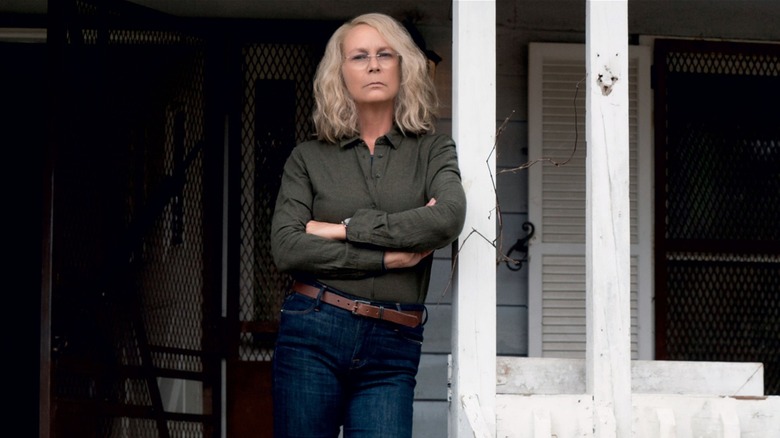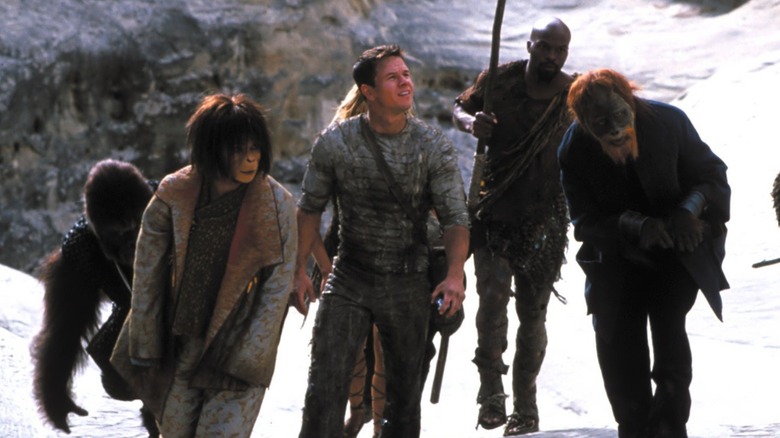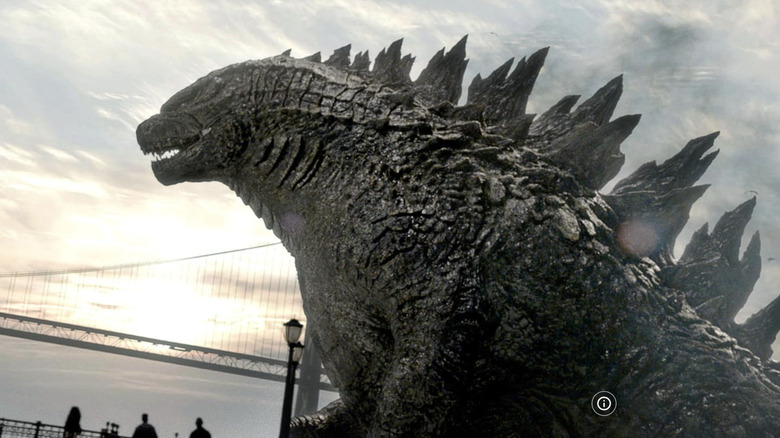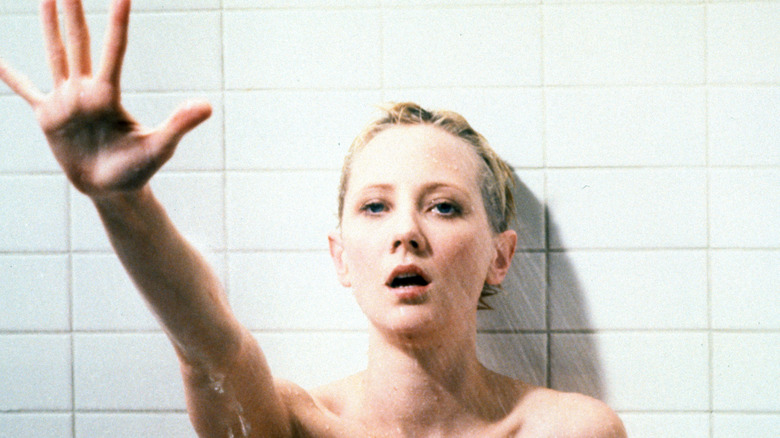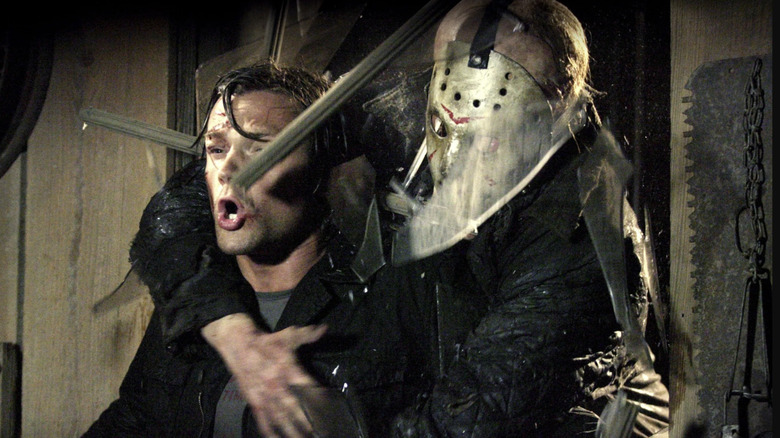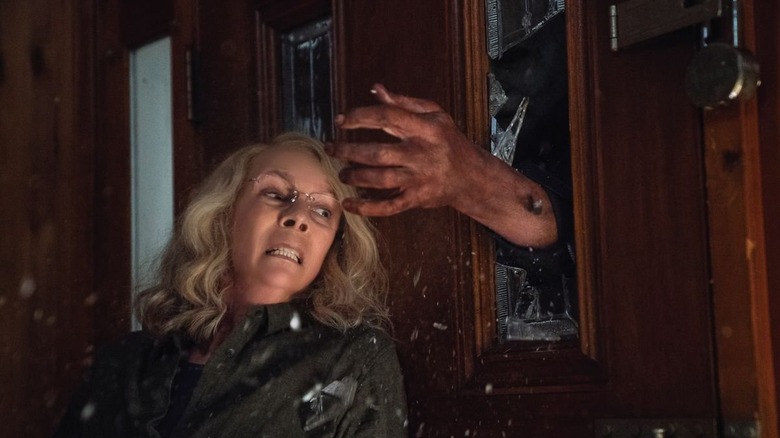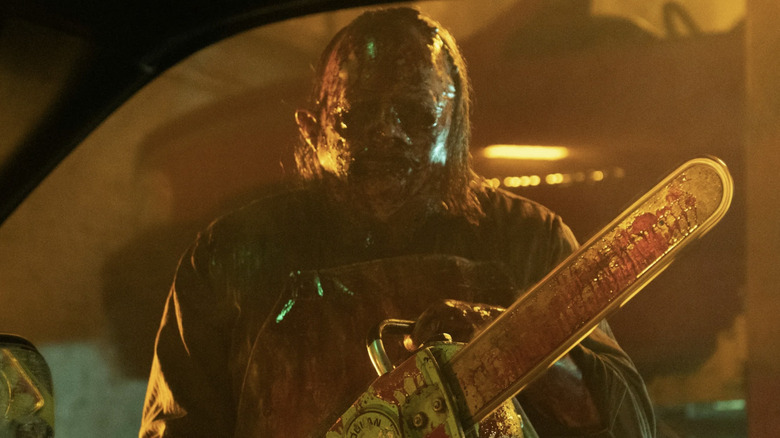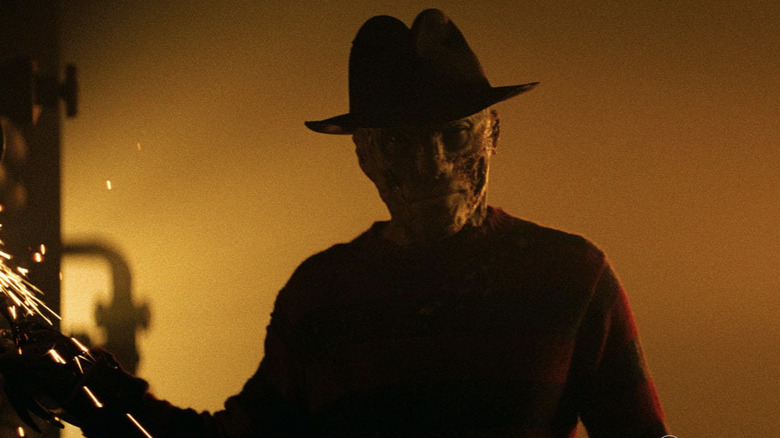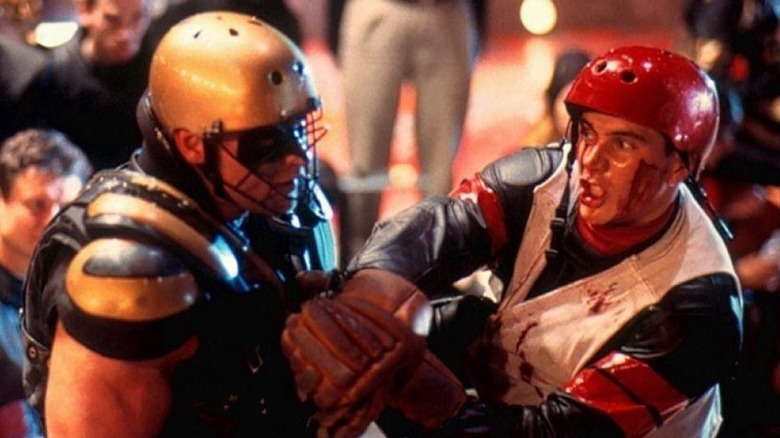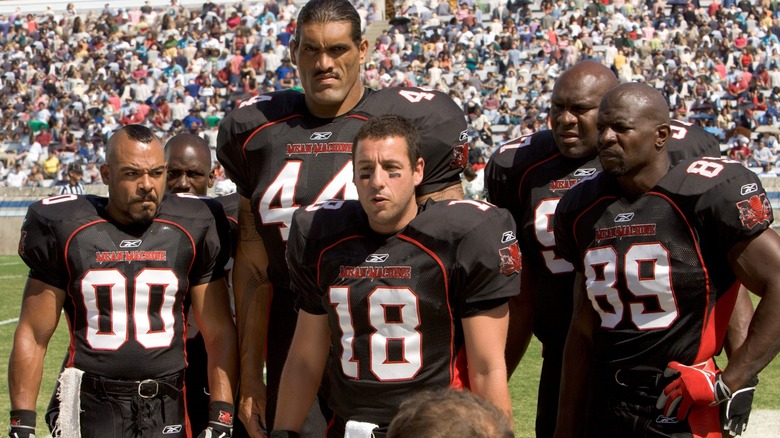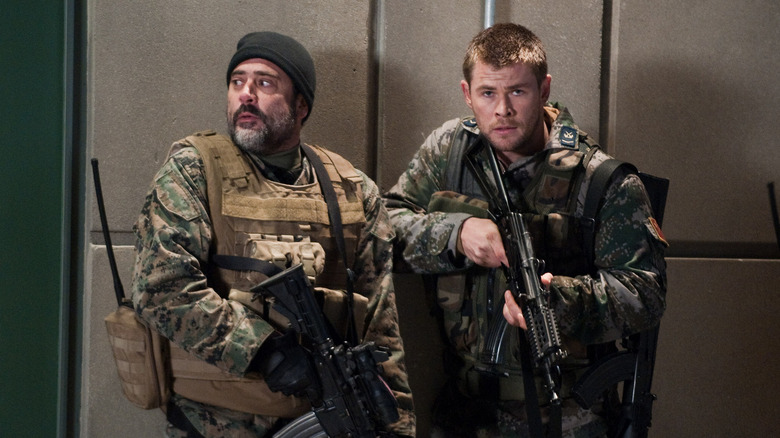Movie Remakes With Worse Rotten Tomatoes Scores Than The Original
Remaking a beloved movie classic is a risky proposition for filmmakers. Fans can be fiercely protective of their nostalgic favorites and tend to judge these products harshly. The practice of remaking existing films is older than you might think, dating back to the medium's nascent years in the late 19th Century. Georges Méliès' writing and directing debut, 1896's "Un partie de cartes (Card Party)," was the first film remake, applying gentle tweaks to the plot of Louis Lumiere's "Les jouers de cartes arroses" (literally, "The Card Players are Watering"), released just one year earlier.
There have been plenty of properly-done and well-received remakes in film history, including the 1954, 1976, and 2018 re-imaginings of the 1937 Dorothy Parker classic. "A Star is Born." Some remakes even exceed the reach of the originals they're based on, like the 1978 version of "Invasion of the Body Snatchers" (the original was released in 1956). Al Pacino was captivating as Cuban gangster Tony Montana in the 1983 crime classic "Scarface," but some fans are unaware that this was a remake of a 1932 film starring Paul Muni.
All film remakes aren't as well-made or received as those, however. Occasionally a filmmaker thinks they can improve on a classic due to sheer hubris. Other botched remakes are actually tributes gone awry, while still others are the result of a studio trying to wring the last bits of money (and life) from a franchise. In fact, all three factors came together to produce the first film on our list.
Planet of the Apes
The 1968 science fiction drama "Planet of the Apes" stars Charlton Heston as astronaut George Taylor, who commands a deep space expedition that takes his crew away from Earth for over 2,000 years. They crash land on what they believe is a strange planet, where Taylor — the only member of his crew who survives the crash and its aftermath — is taken prisoner by talking, intelligent apes who rule the planet while humans are primitive and incapable of communication. Taylor — in one of the greatest twist endings of all time — eventually discovers that he has been back on Earth all along.
The film spawned four sequels by 1973, plus additional chapters in 2011, 2014, 2017, and 2024. But in between those two waves of films fell a 2001 remake starring Mark Wahlberg as Captain Leo Davidson, who finds himself in a similar predicament to Taylor. Wahlberg's performance was orders of magnitude less campy and over-the-top than Heston's, and the remake added a couple unnecessary plot developments while still staying mostly true to the story told in the original. Perhaps because the remake's more incoherent twist ending had little or no shock value, the Tim Burton-directed effort is not as well-regarded as Franklin J. Schaffner's original.
The 1968 version has an 86% Tomatometer (from critics) and 88% Popcornmeter (from audiences) rating at Rotten Tomatoes, which are substantially better than the 2001 version's corresponding scores of 43% and 27%. It's not the biggest disparity on this list, but it's enough to earn a spot.
Godzilla
The original "Gozdilla," released in Japan in 1954, capitalized on global fears of nuclear weapons with its tale of a prehistoric beast that emerges to destroy Tokyo. Two years after the film captivated Japanese audiences, an English-dubbed version called "Godzilla: King of the Monsters" hit American theaters, with the franchise since spawning more than 30 related films over 70 years and counting. But the only other two films called simply "Godzilla," — both made in Hollywood — were released in 1998 and 2014, and neither can challenge the Rotten Tomatoes scores of the original.
The 1954 Japanese "Godzilla" has 94% Tomatometer and 89% Popcornmeter ratings, while the 1998 remake starring Matthew Broderick and Jean Reno sits closer to the bottom of the scale with a 20% Tomatometer reading and a 28% Popcornmeter score. The 2014 "Godzilla" re-remake, starring Bryan Cranston and Elizabeth Olsen, fares much better with a 76% Tomatometer rating to go along with its 66% Popcornmeter score. Apparently Walter White and Wanda Maximoff made more compelling Godzilla-fighters than Ferris Bueller and a hit man with a heart.
The 1998 flick was a domestic box office bomb that picked up Razzie nominations for worst picture, worst director (Roland Emmerich), and worst screenplay (Emmerich and Dean Devlin). It won Razzies for worst supporting actress (Maria Pitillo) and for worst remake, which it shared with the film adaptation of the British TV series "The Avengers" along with the next film on our list.
Psycho
1998 was a tough year for remakes of '60s classics. While the 1960 Alfred Hitchcock horror masterpiece "Psycho" has a 97% Tomatometer and a 95% Popcornmeter rating, Gus Van Sant's attempt to re-do it in 1998 with Vince Vaughn and Anne Heche is rated 41% by critics and 28% by audiences. If you're wondering why the "My Own Private Idaho" director tried to remake the American Film Institute's 18th-ranked film of all time, maybe you could head a major studio. After the success of "Drugstore Cowboy" in 1989, he began telling curious film executives that he wanted his next project to be a shot-for-shot remake of "Psycho."
They all smartly passed, until he had another big smash with "Good Will Hunting" in 1997. While they were still counting the $226 million the best picture nominee brought in, the suits miraculously came around on a "Psycho" remake and gave Van Sant $60 million to craft it. The remake isn't bad, but there's no suspense for Van Sant to build in retelling a 40-year old story note for note (only in color). The best thing about the remake is the killer (pun intended) cast that includes Julianne Moore, Viggo Mortensen, William H. Macy, Robert Forster, and Philip Baker Hall. Sadly, however, at times it seems they're in the midst of an acting exercise or group audition using the original film as source material.
Friday the 13th
Another horror classic that should have left well enough alone was the 1980 genre game-changer "Friday the 13th." It established standards like showing murders from the killer's point of view, the "it was all a dream" twist at the end, and the "Final Girl" trope. Like so many other classics on this list, it inspired a long chain of sequels and spinoffs, plus one true remake. That one was released in 2009 and came in last in our rankings of every "Friday The 13th" movie.
It earned 26% on the Tomatometer and 47% on the Popcornmeter, compared to 67% and 60% respective Rotten Tomatoes scores for the original. Audiences got some interesting backstory fill-in on villain Jason Voorhees in the remake, but it followed much of the formula of the previous films. That prevents it from standing out in any way, although it's far from the most disappointing remake ever made.
Halloween
Two years before Jason Voorhees first terrorized campers at Crystal Lake, John Carpenter brought another iconic masked killer to the screen. That was Michael Myers, who escapes from a mental health treatment facility and returns to his hometown to slay a string of teenagers in "Halloween." The original starred a young Jamie Lee Curtis, Donald Pleasance, and Nick Castle as the masked version of Myers. It has a 97% Tomatometer score to go along with an 89% audience rating, while the 2018 remake comes in with respectable scores of 79% from critics and 72% from audiences.
Those numbers are due in large part to Curtis returning in her role as Laurie Strode, who has to fend Myers off one more time 40 years later. The original was Curtis' first feature film role, and she returned as Laurie in six of the franchise's sequels. Judy Greer plays her daughter Karen in the 2018 sequel, though she loses her life by the end of the next movie in the franchise, "Halloween Kills."
Texas Chainsaw Massacre
There's something about decades-old influential genre classics that makes them enticing prospects for remakes, yet so many miss the mark. 1974's original "The Texas Chain Saw Massacre" is one of the most nightmarish horror movies of all time, and enjoys a 84% Tomatometer score and an 82% Popcornmeter rating at Rotten Tomatoes. It launched a franchise that stands at nine films and counting, but the one that best qualifies as a remake is the 2003 version.
This was a bloodier flick that abandoned the original's documentary style and has earned Rotten Tomatoes approval ratings of 37% from critics and 58% from fans. It stars Jessica Biel and Jonathan Tucker as terrorized teens who just want to go see Lynyrd Skynyrd, R. Lee Ermey as a murderous sheriff, and Andrew Bryniarski as an even more terrifying Leatherface than the one portrayed by Gunnar Hansen in the original.
The most recent film in the series — 2022's "Texas Chainsaw Massacre" — was more of a divergent sequel than a remake, and has even worse Rotten Tomatoes scores of 30% from critics and 25% from audiences. Marilyn Burns, who played the original film's Final Girl, Sally Hardesty, died in 2014, so the part went to Olwen Fouere in the reboot. There were continuity issues with Sally since she apparently died in some of the intervening films, but the character who returns in 2022 is clearly intended to be the same one who was traumatized in the original.
A Nightmare on Elm Street
Closing out our roster of disappointing horror film remakes is 2010's "A Nightmare on Elm Street," which swapped in Jackie Earle Haley as villain Freddy Krueger, who was played by Robert Englund in Wes Craven's 1984 original. That film has a 94% from critics and impressive 84% from moviegoers at Rotten Tomatoes, compared to the 2010 version's respective scores of 14% and 43%. The two films are first and last respectively among the franchise's nine canon movies, and this one is clearly a case of creatives running out of story before fans were tired of Freddy.
Rooney Mara and Kyle Gallner play Nancy Holbrook and Quentin Smith, who have their dreams invaded by Freddy just like Nancy Thompson and Glen Lantz (Heather Langenkamp and Johnny Depp) in the original. After the film wrapped, Mara revealed that her experience making it almost drove her out of Hollywood. In 2011, she told Entertainment Weekly that she had thought, "If this is what my opportunities are going to be like, then I'm not that interested in acting ... And then I got the 'Social Network' script. That kind of reinspired me."
Some critics pointed out that her disinterest was evident onscreen, including Amy Simon of Three Imaginary Girls. After handing Haley kudos for taking on the impossible task of replacing Englund, Simon criticized the script for cherry-picking moments from previous films to use as audience touchstones, adding, "In addition, the script tries to trick you with the possibility that maybe Fred Krueger didn't actually do anything wrong, and the parents burned him by mistake."
Rollerball
The 1975 dystopian sci-fi flick "Rollerball" isn't as beloved as "The Texas Chain Saw Massacre" or "Psycho," but it shares a less impressive remake with those two horror classics. The original film starred James Caan, John Houseman, and Maud Adams, earning a 69% approval rating from critics and a 62% from audiences at Rotten Tomatoes. Those are good-but-not-great numbers, but far exceed the 3% and 14% ratings of the 2002 remake starring Chris Klein, Jean Reno, and LL Cool J.
The remake makes no attempt to echo the anti-capitalist, anti-materialist message of the original, instead going as far as it can to ignore such matters. Matt Donato of Bloody Disgusting hammered its simplicity, writing, "It's packed with gawking female nudity and violence for the sake of violence, avoiding worldview stances that'd threaten its rotation in syndicated cable movie marathons." The titular sport is inscrutable and chaotic in the remake, and its rules are confusing. Don't worry about the rules, though, because league owner Alexis Petrovich (Reno) suspends them — along with penalties and fouls — during the final match.
The film ultimately landed director John McTiernan in federal prison for 10 months, although he wasn't convicted of making a confounding mess of a movie. His sentence was for lying to the FBI in a wiretapping case that stemmed from a dispute he had with the film's producer, Charles Roven.
The Longest Yard
Let's go from a remake about a fictional sport that landed its director in prison to one about a real-life sport played behind the walls of a fictional prison. In 1974 — a year before the release of the original "Rollerball" — Burt Reynolds starred in "The Longest Yard" as former NFL quarterback Paul Crewe, who is tasked with assembling a team of inmates to compete against their prison's guards. It has a 76% rating from critics and a 75% from audiences at Rotten Tomatoes, while the 2005 remake starring Adam Sandler as Crewe trails by several touchdowns with ratings of 32% from critics and 62% from audiences.
Reynolds returned in the later version as former NFL coach Nate Scarborough, and picked up a Razzie nomination for worst supporting actor. The remake of "The Longest Yard" earned reams of unfavorable comparisons to the original from critics, but Rob Gonsalves of Rob's Movie Vault used the film to knock Hollywood as a whole. "Comparing the 1974 movie with the 2005 remake," he wrote, "yields the dispiriting insight that Hollywood can't even make credible rabble-rousing junk any more."
Red Dawn
If it's rabble-rousing junk you're looking for, look no further than the 2012 remake of 1984's "Red Dawn." The original has a 48% approval rating at Rotten Tomatoes from critics and 65% from audiences, which is the lowest of any on this list. The soulless 2012 remake, however, could only manage a 15% from critics and 50% from audiences. Both films tell the story of a group of teenagers who establish a guerilla-style resistance after an invasion of the United States. The aggressor in the original is the Soviet Union, while it's North Korea in the remake, although it gradually becomes evident that this one won't match up to the original.
Where the 1984 original had a best-of-the-'80s cast including Patrick Swayze, Charlie Sheen, Jennifer Grey, Lea Thompson, and C. Thomas Howell, the remake gave us Chris Hemsworth, Isabel Lucas, Adrianne Palicki, and Josh Hutcherson. It also swapped out the thoughtful grittiness of the original for a more brash tone filled with trite "rally the troops" speeches from Hemsworth's Jed Eckert. Hemsworth doesn't even try to revive Swayze's Jed, abandoning his gentle fatherly nature for a brusque military manner.
Much of the difference in tone between the two films comes from the Jed Eckert wellspring. Swayze's was a Rocky Mountains-raised outdoorsman who used his survival skills to help keep others alive, while Hemsworth's is a Marine back from war who trains his rag-tag bunch. In the original, Jed and his brother Matt (Sheen) are close friends who lean on each other, but Hemsworth and Josh Peck in the same roles have a less harmonious relationship in the remake. It's a significant factor in the remake's lack of charm.
